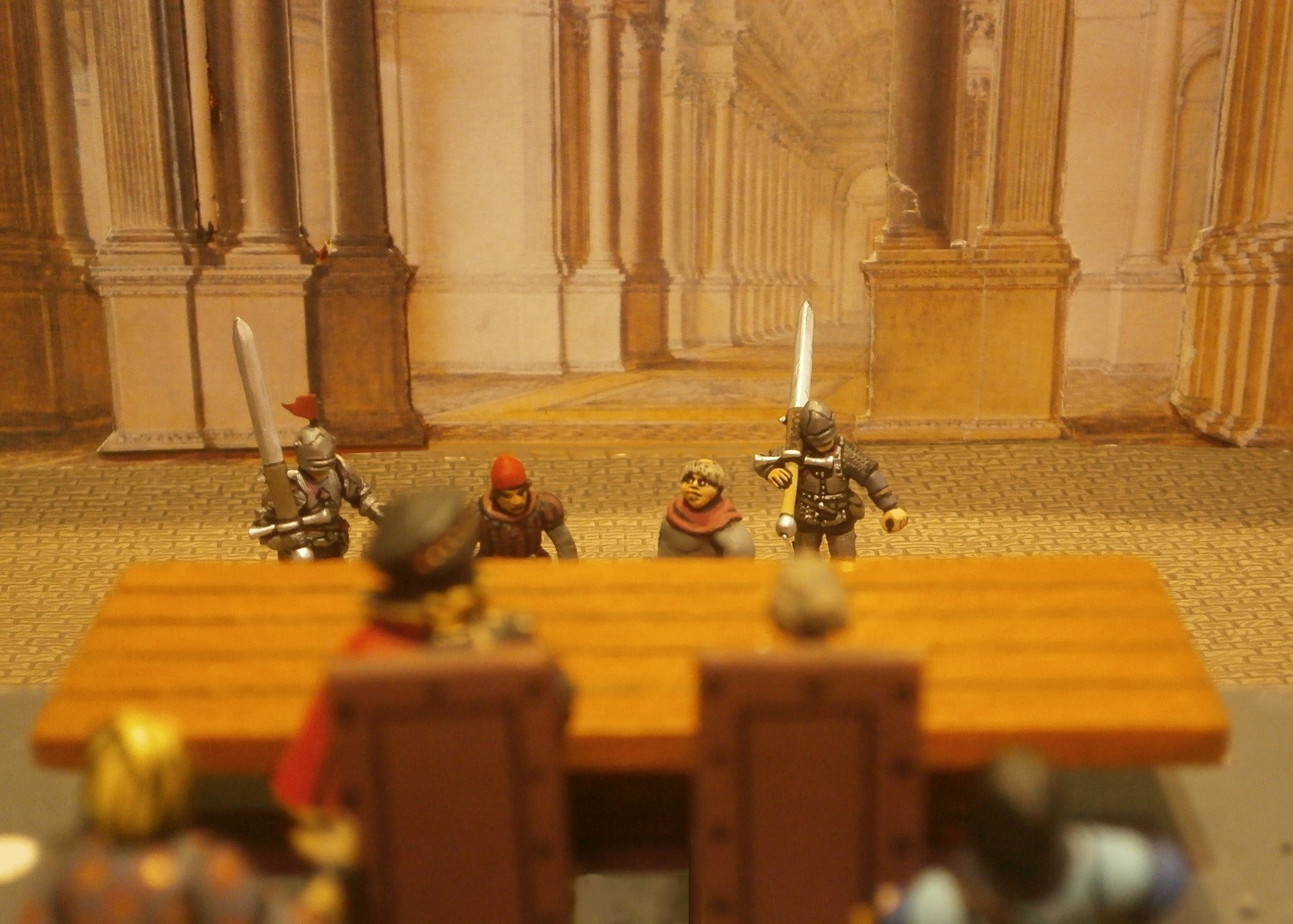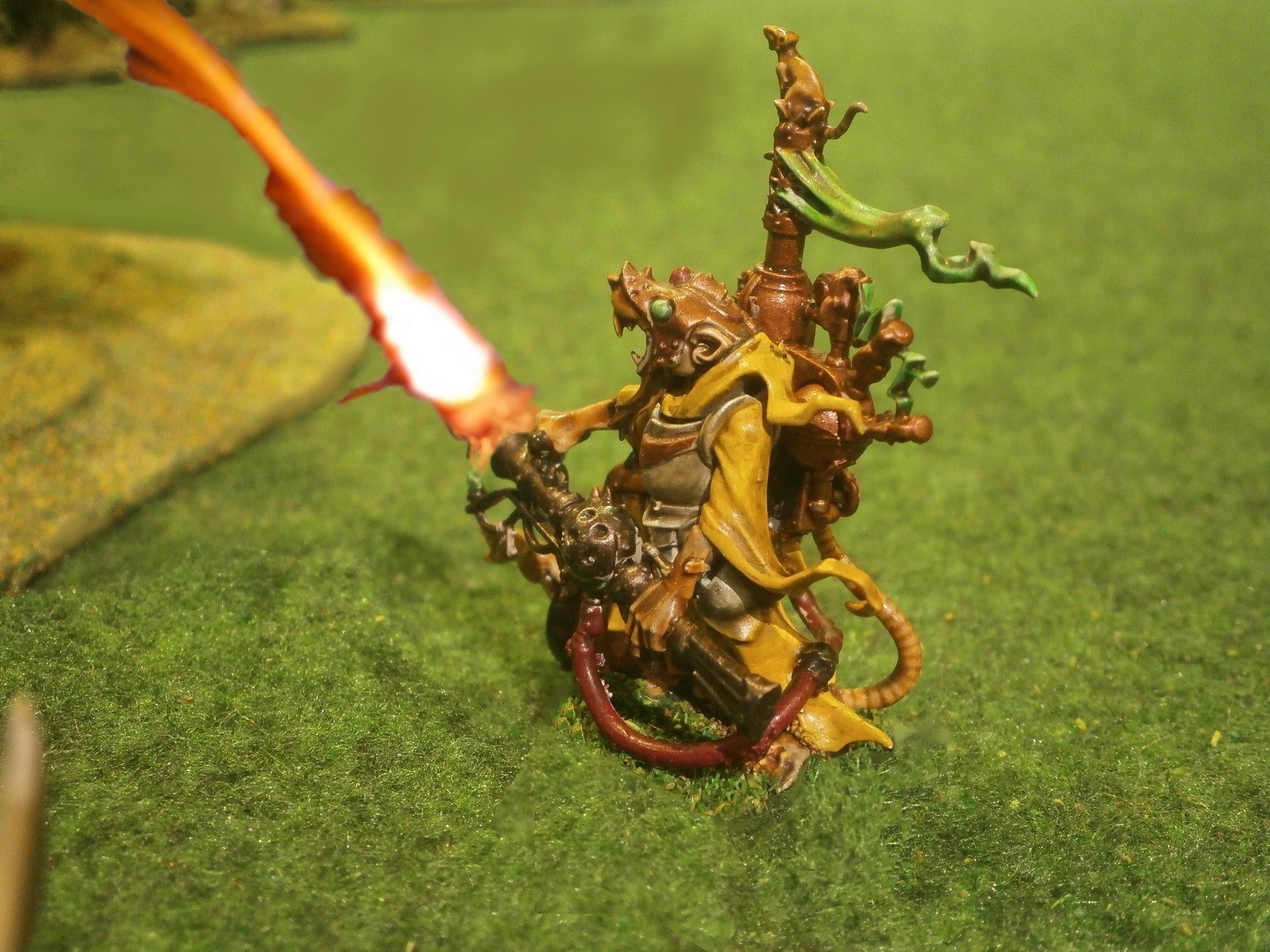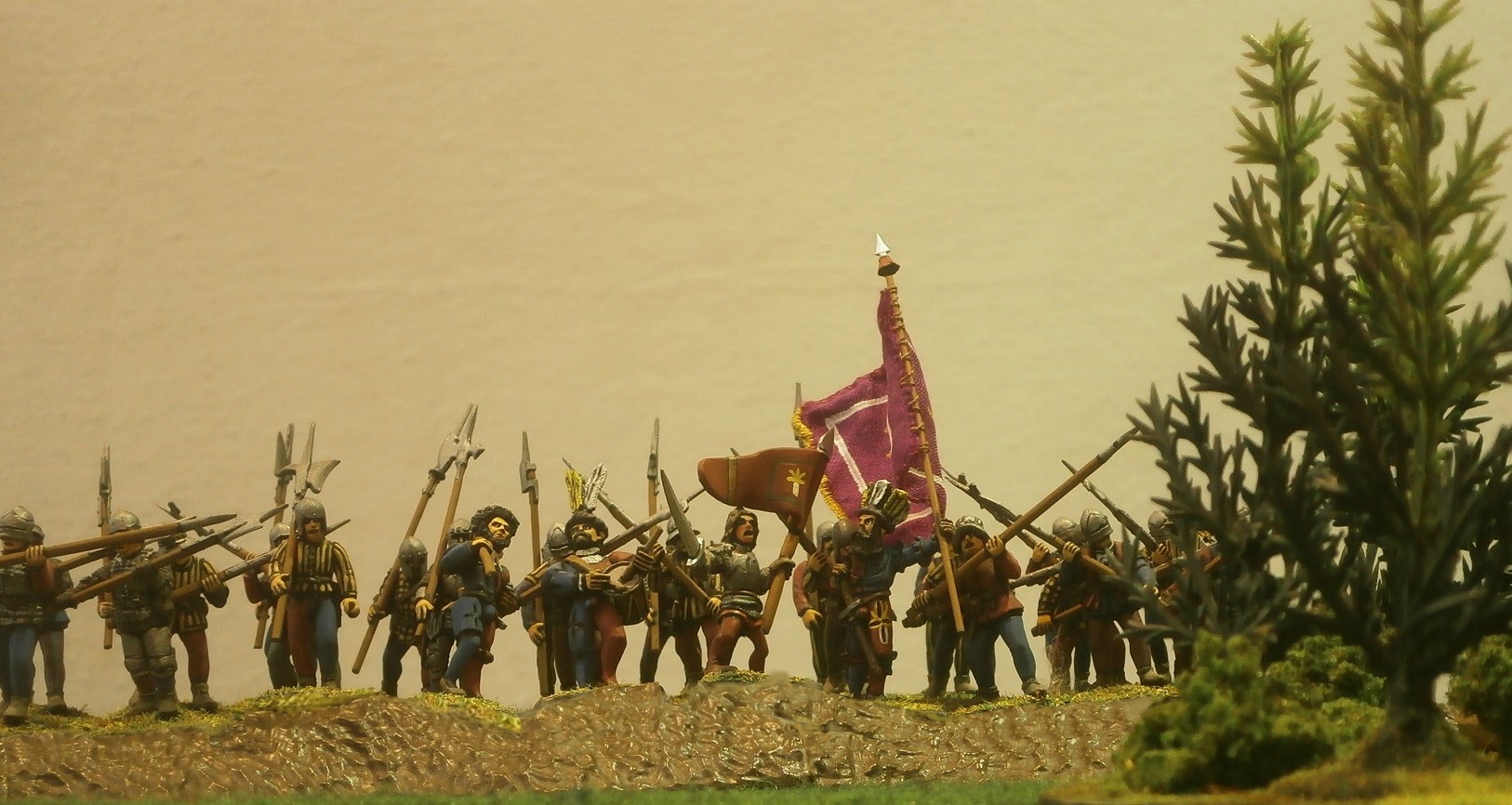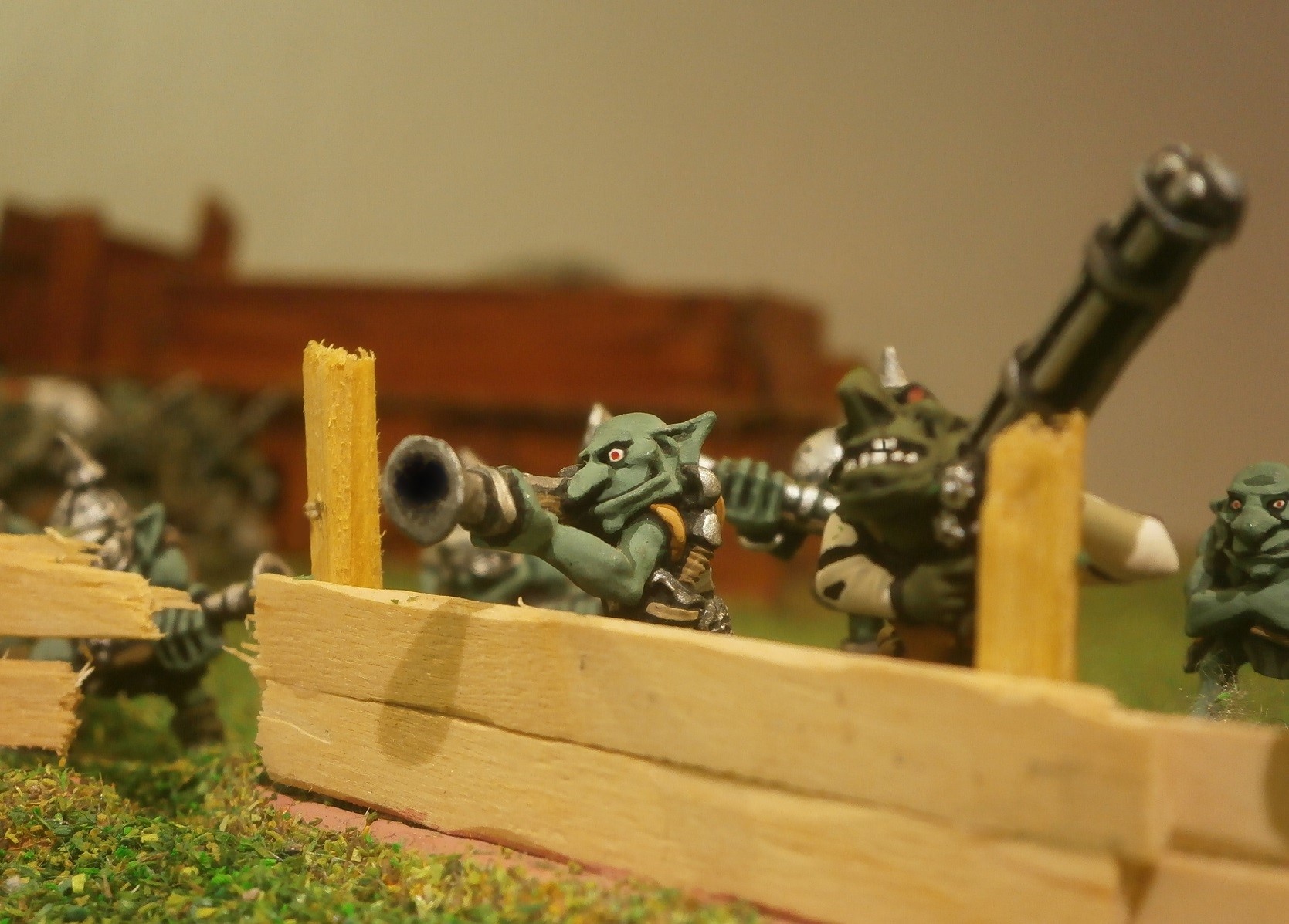Part 3, The Fighting Ends
(
Game Note: The annihilation mortar took 3 wounds from the crossbowmen in turn 2, and so was now reduced to a mere 2 wounds. This explains David’s attempt to move it to the river’s edge by another, safer route. The trouble is, whichever enemy unit arrives per turn from now on, they can deploy anywhere on the table edge behind the river (having come from that side of the river), and so most likely will be close to the engine &/or facing its intended destination. Luckily for David, as the enemy is an NPC force, so the particular units which arrived were being randomly rolled for from a list of those still in the city (i.e. those not already having been lured away by the ‘distraction’ in Buldio.) David also knew a last desperate course of action could simply be to attempt fire the engine anyway, for a 50% reduced likelihood of reaching the city.)
Now back to the story account of the game’s events.
Upon the far side of the river, entering the field with a flamboyant fluttering of flags, the largest regiment of the Compagnia del Sole, the halberdiers, marched on. They bore their enchanted banner, blessed by the goddess Myrmidia. Apart from their armour, both leather and steel, they were clothed in the company’s maroon and blue, some sporting the Myrmidian white baton and yellow half-sun emblem that was also emblazoned upon their standard.

Leading them, and carrying an older, smaller, but more precious banner (the oldest in the company and the army standard) was Marshal Luigi Esposito, General Mazallini’s second in command. He had been left to govern the city while the general led the relief force to Buldio, and so it was he was the first to hear from the scouting riders of the enemy’s approach from the south. A small man, he had proved himself in battle on many an occasion, a reputation encouraged if not solely enabled by his famously magical armour. Time and time again, blows that ought to have severed his arm or even decapitated him, had proved jarringly ineffective. On this occasion, however, his urge to reach the river quickly had been so pressing he had forgone the buckling of his leg armour and left his helmet lying in his chamber.

Not so Captain Venusto - the fully steel-carapaced fellow who had stepped boldly from the bridge-keeper’s cottage. The captain raised his visor momentarily to look at Marshal Esposito, waved and then slammed it shut again, before charging headlong at the warlock engineer striding purposefully towards him. The overgrown rodent was much taller than the captain and made to appear even more massive by his swirling yellow robes and the hulking brass apparatus strapped to his back.

Entirely inured to the weight of his armour, Venusto arrived in front of the ratman and immediately stepped, nimbly, to one side. Golchramik was bewildered, still clutching the smoking, now useless rocket tube. When Venusto’s vicious cut was made, it sliced deeply, through fur, flesh and ribs. Golchramik fell heavily to the ground, the great weight of his many burdens speeding his collapse, then breathed his last as Venusto hauled the blade up and thrust it through his chest to scrape past the copper contraptions and plunge into the grassy ground underneath.
The captain took a deep breath, yanked the blade free, then shouted “Next!” before running into the trees which lay between him and the engine.
From over the river, the marshal watched, peering through the trees Venusto had penetrated at the dark shape moving noisily on the other side. He immediately realised two things: first, the captain would have to be lucky indeed to reach the engine, as fully armoured fellows rarely fared well in a sprint through the woods; and secondly, he and his halberdiers could not cross by the bridge, not if they were to have any real chance of reaching the engine.
On the Campogrottans’ far right the mounted crossbowmen made their way as best they could between the trees and the huge mob of slaves, hoping to find a way to catch the engine.
(
Game Note: Their failed Ld test meant they could not march within 8” of the enemy.)
Those upon the front-left of the body who could see the engine had high hopes of reaching it, for it lurched and careened most ungainly as it moved over the rougher ground malformed by the trees’ roots, like a badly-trimmed ship might sail in choppy waters, crankily heeling over for too long and too far.
Indeed, it looked like it might itself be the author of its own demise, for if it were to keel over it certainly would not be firing anything that day!
Perette and the Brabanzon crossed the bridge, but then she raised her hand to halt them.
She knew if they rode any further they would put themselves between the crossbowmen and the engine, preventing another shot, which would be a shame considering their volley had done so much to discourage it previously! Besides, from here her riders could shoot and she could conjure more magic. There was no need to move on, especially when that would almost certainly mean she and her companions were hit from two sides by a veritable horde of ratto uomo. She did not know it, but her caution caused the dwarven cannoneers’ cursing to redouble, for now the Brabanzon blocked any glimpse of the engine they might otherwise have had.
Kissing the ruby ring she wore on her right hand, she released its magic and sent several fireballs curling towards the engine. But the etheric winds were weakened by the enemy’s will, and all dissipated before reaching their target.
Annoyed by the sight, she allowed her anger to add a sharp edge to her own incantation and conjured more fireballs, this time of her own volition. One alone reached the engine, bursting to send sparks washing over it. An attendant fell, squealing in agony, his waxen robes ablaze, his squeals ceasing suddenly when the copper tank on his back popped.
(Game Note: The engine was, at this moment, down to its last wound!)
Perette cursed, for the engine was still moving. Worse still, she was horrified to see that the paths of several stray fireballs and the volley of quarrels from the crossbowmen had crossed, diverting most of the missiles to spin over and into the ground. Their third shot had thus failed completely.
Neither she, her riders nor the Compagnia’s crossbowmen had managed to stop the engine. Nor could Captain Venusto, for as he emerged from the trees the engine was picking up pace, and just before he could reach it to land a blow he was tumbled by a tree root.
(Game Note: Venusto’s overrun, directly towards the engine, after defeating the warlock engineer, had proven a little bit more than 1 inch too short!)
The engineer at the wheel’s rear knew his mechanical ward was closer to catastrophe than ever before. Barely any attendants were left to assist its passage, and the driver at the heart of the wheel seemed to have finally perished during the shower of fireballs that had washed over and through the engine. He alone remained to steer the engine, which would take all his strength, perhaps requiring more than he had to give. And if the engine was to fire, then he could only hope that he and those attendants who survived were up to the task.
The regiments here to guard the engine, however, had little understanding of its precarious state, and now launched charges intended to ensure its continued progress. They could not allow the Brabanzon and the fire-wizard to continue their pursuit, nor could they risk another shot from the crossbowmen. And so, as the slaves hurtled into the footsoldiers behind the painted pavaises, the guard regiment began its charge against the riders.
Several slaves perished from the crossbowmen’s countershot, but such was the size of the mob that their demise went entirely unnoticed by either friend or foe. Like the arrival of a heavy wave upon a beach, they crashed against the pavaises; then they set about the bloody work of blades, claws and teeth.
So busy were they in slaughter, that not one slave noticed the Brabanzon riders’ flight across the bridge.
Of course, the guard regiment were fully aware, for barely had they taken two steps before the enemy was off, away and out of reach.
In truth, Perette had had little say in the matter. Weakened as she was by her conjurings and wounded by the magical flames she had earlier failed to master fully, she simply went along with the riders as a jumble of instructions tumbled at her: “This way, my Lady”, “Come, now!” and “We must flee!”
The riders had not come here to sacrifice themselves as martyrs to Campogrotta’s cause. Nor, after all they had been through, not least witnessing the slaughter of almost every other Brabanzon soldier at Ravola, did they intend to throw their lives away for the sake of pride or honour. Most of all, perhaps, they could not allow their beloved lady to die. Instead, they would ride away, regroup, and when the enemy was far enough behind that they could think, they would
then decide what was for the best.
As the engine rolled on between the two woods, the engineer, despite his mask, could suddenly taste the poisonous vapours leaking from the grenado even through his mask, and feel the sting of the etheric heat as it wormed its way into the material world to become sharp tendrils of real heat. The last of the attendants stumbled in pain as they tried to keep up, while two of the plague monks and two more of the jezzailers close by succumbed to the surging toxicity of the unstable orb within the bombard’s barrel.
Captain Venusto also stumbled as he raised himself from his fall, having to clutch at a branch with his steel-gauntleted hand to prevent himself from falling again. There he hung for a moment, wheezing, as his head swam, his great sword trailing on the ground.
The engineer’s throat was burning, his eyes pouring tears that misted up the tinted glass of his mask’s lenses. Suddenly, he realised the pained screeching he could hear close by was emanating from between his own clenched teeth. Somewhere in the deepest recesses of his fevered mind a quiet voice declared, “So this is the end?”
The slaves brutally mauled the crossbowmen, so that only a handful escaped the rusted blades to perish instead in the river water. The jezzails on the hill first cheered when at last their bullets hit home and tore two riders from their saddles, while a third was thrown hard onto the ground when another bullet shattered his mount’s head, but then they cursed as the remaining riders simply rode on after the engine.
Meawhile, a newly arrived regiment of Karak Borgo quarrellers were marching up the river’s edge (being part of Narhak, the Thane of Dravaz’s Campogrottan contingent) to further threaten the engine’s demise.
Desperate, yet also glad he had left off most of his armour, the Compagnia’s marshal led his men into the rushing waters, where a dozen sank to their deaths.
Somehow, he knew he must reach the engine. Whatever it was, whatever it did, the enemy were obviously deadly determined to do it. He could see even the ratmen were dropping around it, and he could feel the awful aura it exuded. If the engine merely reached the river, there to plunge to its ruin, the waters would likely run poisonous for many a league, perhaps even to the sea, and a vast throng could die as a consequence. The city of Campogrotta itself would most likely be poisoned too.
(Game note: Dangerous Terrain tests seem a bit too ‘weak’ at times. This was not a stream, but a large river which carried river traffic, deep enough to require a bridge. So, not wishing to rule the river impassable as I have in past games, and thus deny a dramatic attempt to cross, I ruled that the 41 models would take two Dangerous Terrain tests each. It is summer, when the rivers are lower than Spring, and this is quite some distance from the sea, so it wouldn’t be at its deepest. 82D were rolled, 12D came up 1. I think the halberdiers did well. The sad thing is that they were still in the river at the end of their turn, being unable to march move, and so would have to take the double tests again! I did say the marshal was desperate!)
As the dwarf quarrellers prepared their crossbows for a shot …
… the engine was decelerating, its warpstone-heated tanks leaking spark-laced steam out of several ruptures. Again, the wheel lurched wildly to one side, which the engineer only just managed to correct using all his remaining strength.
It was now obvious to him that the engine would not reach the river’s edge, from where all the engineers had agreed it should definitely be within range of the city. Worse still, if the dwarven quarrellers were to shoot, or the horsemen caught up from behind, it might never shoot at all!
He managed to transform his screeching into a shouted command. And very simple it was too, being just, “Now!”
“Now! Now! Now!”
Yanking the brake handle to full lock, he slowed the engine to a stop, then jumped from the platform. He hit the ground hard, his legs buckling beneath him, and as his body thumped down, his mask slipped. One, involuntarily gasp of the foully metallic air, was all it took to end his life in that moment.
Only two engine attendants remained, of which one retained the wit and strength necessary to make his way to the bombard’s rear, where its carriage was connected to the driving wheel. He scrambled up onto the carriage so that he could reach the firing hammer. The other surviving attendant was reeling about, utterly lost in confusion, attempting to recite some rhyming instructions on how to fire that he had rote-learned. The words had to be wrong, he finally decided, because they no longer rhymed!
The first attendant, however, had a better idea concerning what to do. He now yanked at a little chain to release the preventer pin, then tore off the cracked-leather stall covering the flint-shard. Some part of his mind was complaining about the procedure, particularly the order in which he was supposed to do things, but with most of his brain screaming about the pain he was experiencing, he couldn’t sift out what was nagging at him. Fumbling in his apron’s pouch, he pulled out an iron tool. It was not the tool he wanted, but one of its edges would suffice for scraping, which is what he now began to do, clearing away the sticky gobbet of wax protecting the touch hole. One of his eyes wouldn’t open, so nothing was quite as near or far as he thought it was, but most of the wax came away. His finger tips fizzled as he scraped so close to the barrel. Thrusting his hands back into the pouch he began pulling things out and discarding them. The fourth thing he dropped was a powder flask, which clattered down between the carriage parts to the ground below. Whilst grabbing at the fifth item he realised it was the flask he needed, so he stretched to reach down between the timber and iron parts, his feet clutching as tight as his hand to keep a hold while he strained down with the other. As the tip of his middle finger claw scratched at the flask, his head was swimming and the flask seemed to be spinning, so he stopped for a moment and to steady himself.
As he hung there, he realised that the bombard's carriage was, almost imperceptibly, tipping sideways. Painfully, he twisted to peer back and saw the wheel behind was leaning precariously to one side. As it was still linked to the bombard, it was most likely in the process of capsizing that too. Straining his one good eye, he could see the reason - the wheel's starboard rim-tread was still, albeit very slowly as it strained to grind through the mud below, rotating. That wheel could be his doom!
“Never stop,” they had told him and the others. " Never, ever stop," they had repeated ad nauseam. Then, he remembered that amongst some confusingly contrary instructions concerning what to do if the engine
did stop, someone said, “And whatever you do, never stop on soft ground.”
Blinking the one eye he could (it felt like the other was melting and dribbling into his cheek-fur) he squinted down to locate the flask. It was lying in the mud. He stretched out his arm again.
The wheel was now leaning over more than should be possible, but the great weight of the attached bombard was apparently sufficient, momentarily at least, to delay its full fall. Nevertheless, the bombard was moving a tiny bit more with each passing moment.
Using his claw he hooked the flask's leather strap and lifted it. Hauling himself back up to the pan beneath the touch hole he commenced pouring the black powder. It spilled in and immediately began to spill out. The bombard must be leaning over much further than he thought!
“More then,” he muttered and poured the entire contents of the flask onto the pan.
Suddenly, the carriage lurched, one side now lifting right up off the ground as a great groaning sound came from the fatal connection joining the wheel to the carriage.
The bombard was going over. And right now.
“Never stop,” they had said. More than anything other instruction. “Never stop.”
As the ground began to rush towards him, he pulled the hammer’s release.
…
And After
Very few survived the fight at the bridge. One of the crossbow horsemen was found later, without his horse, sobbing on the southern bank of the river more than a league from the bridge. The marshal, soaking wet, red-faced and wheezing, with no armour about him whatsoever, was helped to the city’s southern gate by two of the halberdiers. No other halberdiers returned. Four dwarfen crossbowmen returned, each one with the same crazed expression, but none of the cannoneers.
Perette and her riders had been far enough away to survive, although all needed tending by the city’s chirurgeons to rebalance their badly skewed bodily humors.
This was all just the start of the city’s new misery.










































































